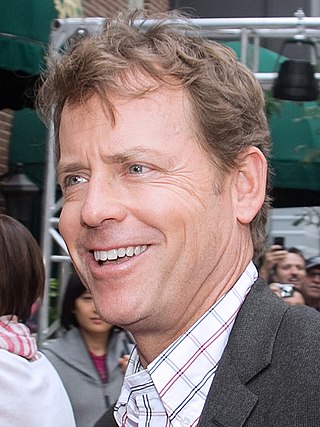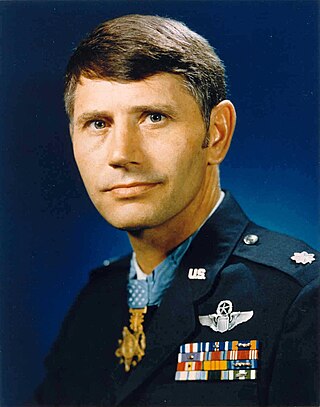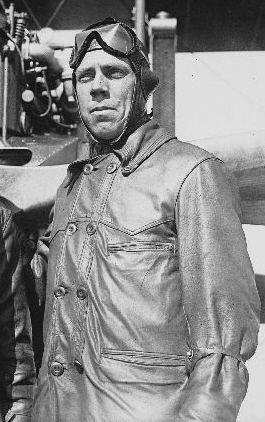Related Research Articles

Brigadier General Charles Elwood Yeager was a United States Air Force officer, flying ace, and record-setting test pilot who in October 1947 became the first pilot in history confirmed to have exceeded the speed of sound in level flight.

Joseph William Kittinger II was an officer in the United States Air Force (USAF) who served from 1950 to 1978, and earned Command Pilot status before retiring with the rank of colonel. He held the world record for the highest skydive—102,800 feet (31.3 km)—from 1960 until 2012.

The 101st Airborne Division (Air Assault) ("Screaming Eagles") is a light infantry division of the United States Army that specializes in air assault operations. It can plan, coordinate, and execute multiple battalion-size air assault operations to seize terrain. These operations can be conducted by mobile teams covering large distances, fighting behind enemy lines, and working in austere environments with limited or degraded infrastructure. Its unique battlefield mobility and high level of training have kept it in the vanguard of U.S. land combat forces in recent conflicts: for example, foreign internal defense and counterterrorism operations in Iraq, in Afghanistan in 2015–2016, and in Syria, as part of Operation Inherent Resolve in 2018–2021.

Valhalla Memorial Park Cemetery is located at 10621 Victory Boulevard in North Hollywood and Burbank, California.

The Distinguished Flying Cross (DFC) is a military decoration of the United States Armed Forces. The medal was established on July 2, 1926, and is currently awarded to any persons who, after April 6, 1917, distinguish themselves by single acts of heroism or extraordinary achievement while participating in aerial flight. Both heroism and extraordinary achievement are entirely distinctive, involving operations that are not routine. The medal may be awarded to friendly foreign military members in ranks equivalent to U.S. Pay Grade of O-6 and below, in actual combat in support operations.

Gregory Buck Kinnear is an American actor. He was nominated for an Academy Award for Best Supporting Actor for his role in As Good as It Gets (1997).

The Fédération aéronautique internationale is the world governing body for air sports, and also stewards definitions regarding human spaceflight. It was founded on 14 October 1905, and is headquartered in Lausanne, Switzerland. It maintains world records for aeronautical activities, including ballooning, aeromodeling, and unmanned aerial vehicles (drones), as well as flights into space.

Project Excelsior was a series of parachute jumps made by Joseph Kittinger of the United States Air Force in 1959 and 1960 from helium balloons in the stratosphere. The purpose was to test the Beaupre multi-stage parachute system intended to be used by pilots ejecting from high altitude. In one of these jumps Kittinger set world records for the longest parachute drogue fall, the highest parachute jump, and the fastest speed by a human through the atmosphere. He held the latter two of these records for 52 years, until they were broken by Felix Baumgartner of the Red Bull Stratos project in 2012, though he still holds the world record for longest time in free fall.
The National Aeronautic Association of the United States (NAA) is a non-profit 501(c)(3) organization and a founding member of the Fédération Aéronautique Internationale (FAI). Founded in 1905, it is the oldest national aviation club in the United States and one of the oldest in the world, it serves as the “Aeroclub of the United States” and, by its Mission Statement it is "…dedicated to the advancement of the art, sport and science of aviation in the United States.” The NAA is headquartered at the Ronald Reagan Washington National Airport, in Washington, D.C.

The Perkin Medal is an award given annually by the Society of Chemical Industry to a scientist residing in America for an "innovation in applied chemistry resulting in outstanding commercial development." It is considered the highest honor given in the US chemical industry.

Leo Keith Thorsness was a colonel in the United States Air Force who received the Medal of Honor for his actions in the Vietnam War. He was awarded the medal for an air engagement on April 19, 1967. He was shot down two weeks later and spent almost six years in captivity in North Vietnam as a prisoner of war. After his military service, Thorsness served one term in the Washington State Senate.

Leslie Leroy Irvin was a stunt-man for the fledgling Californian film industry. Flying in balloons, he performed using trapeze acrobatics and parachute descents. For the 1914 film Sky High, Irvin made his first jump out of an airplane while flying at 1,000 feet above the ground. In 1918, he developed his own life-saving static line parachute, jumping with it several times and promoting it to the US Army. Irvin joined the Army Air Service's parachute research team at McCook Field near Dayton, Ohio where he made the first premeditated free-fall jump with the modern parachute on April 28, 1919.

James Floyd Smith was an inventor, aviation pioneer, and parachute manufacturer. With borrowed money, he built, then taught himself to fly his own airplane.

The Daniel Guggenheim Medal is an American engineering award, established by Daniel and Harry Guggenheim. The medal is considered to be one of the greatest honors that can be presented for a lifetime of work in aeronautics. Its first recipient was Orville Wright. Other recipients have included American and international individuals from aeronautical corporations, governments, and academia.
The Mungo Park Medal is awarded by the Royal Scottish Geographical Society in recognition of outstanding contributions to geographical knowledge through exploration and/or research, and/or work of a practical nature of benefit to humanity in potentially hazardous physical and/or social environments. It was founded in honour of the Scottish explorer Mungo Park.
Jacques-André Istel is a French-American recreational parachutist and investment banker and later in life, historian, widely responsible for popularizing parachuting in the United States. He is considered "the father of American skydiving." He founded a city in southeastern California, which he named Felicity and it is here that he founded the Museum of History in Granite.

Albert Leo Stevens was a pioneering balloonist.

Noel Francis Parrish was a brigadier general in the United States Air Force who was the white commander of a group of black airmen known as the Tuskegee Airmen during World War II. He was a key factor in the program's success and in their units being assigned to combat duty. Parrish was born and raised in the south-east United States; he joined the U.S. Army in 1930. He served in the military from 1930 until 1964, and retired as a brigadier general in 1964.

Edward Lincoln Hoffman (1884–1970) was a United States Army Air Service (USAAS) pilot, officer and Engineering Division Chief at McCook Field. With no parachute experience, he formed a team that included aviation pioneers Leslie Irvin and James Floyd Smith which developed the first modern parachute. The 1926 Collier Trophy was awarded to Major E. L. Hoffman, Air Corps for "development of a practical parachute;" the year's greatest achievement in American aviation.
References
- ↑ "History of the Leo Stevens Award". Museum of History in Granite. Archived from the original on 2013-05-15. Retrieved 2010-12-26.
The Leo Stevens Award is the major parachuting award in the United States. ...
- ↑ "The A. Leo Stevens Parachute Medal". Aero.com. Archived from the original on 2010-11-25. Retrieved 2010-12-27.